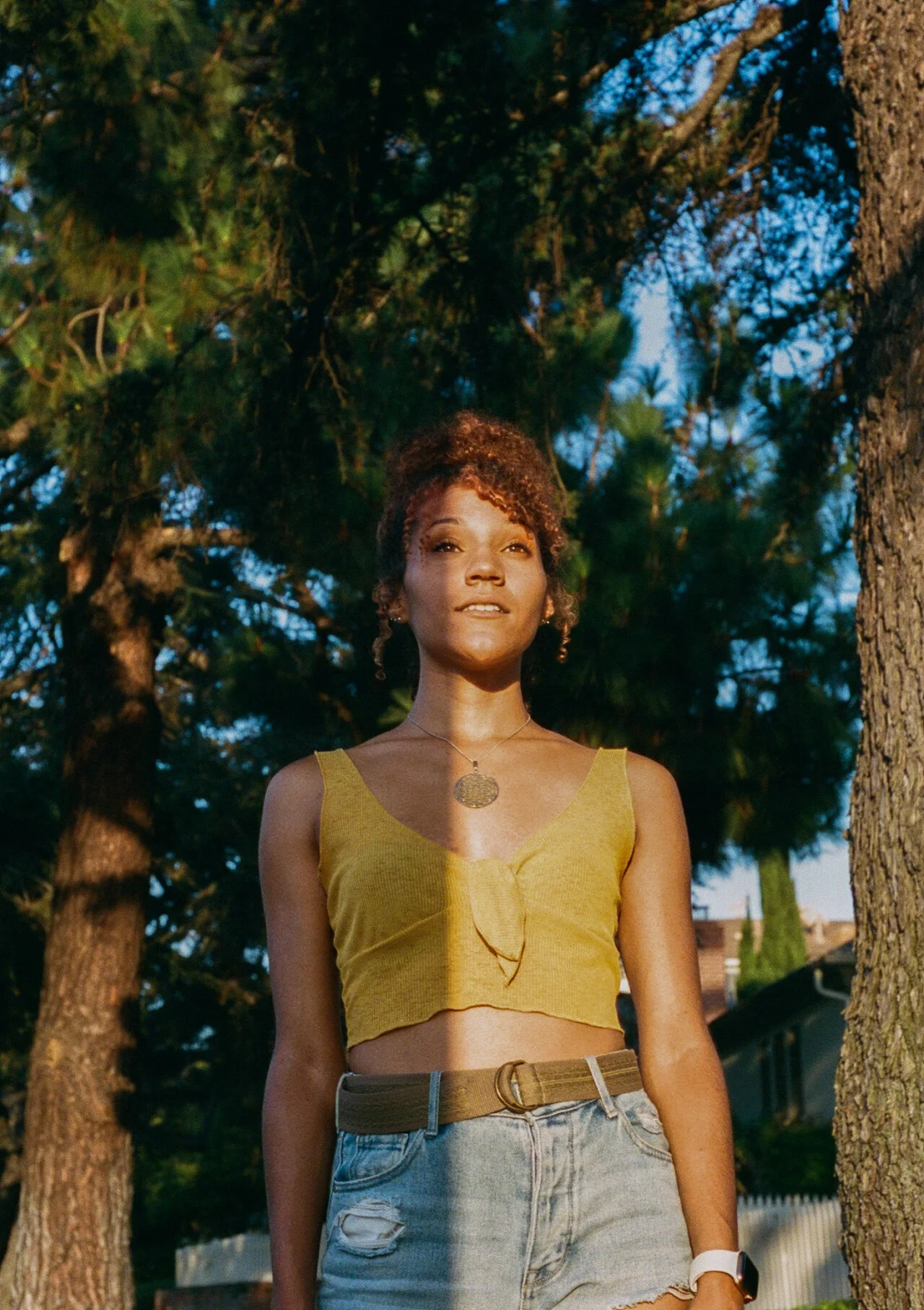Amber
The Bunim-Murray productions offices are close enough to my home that I will often ride my bike to work. Riding home after work I began to notice a young woman painting a utility box along Los Feliz Boulevard. She was only there intermittently, but the incomplete work on the utility box assured me she would return. After passing her a few times over the course of a couple weeks, I could clearly see that she was mixed, or at least appeared to be. It was maybe the fourth time I saw her there, making progress on her painting, that I turned my bike around, rolled up alongside her, and pulling my headphones out of my ears introduced myself. Amber explained what she was doing, and I explained what The PartBlack Project was, and we chatted a little bit, getting to know one another. She told me about the work she does, teaching and working with children. I asked Amber to participate in The PartBlack Project, and obviously, she agreed. We were fortunate to capture the light at dusk, also known in Hollywood as the “magic hour.”
Q: Do you identify as Black? White? Mixed? Something else? Please describe your ethnic/cultural background.
A: I self-id as Mixed with my roots stemming from a separated but blended family dynamic. My dad is African-American and Native American and my mom is German Caucasian. My stepfather is from Nigeria and has had some impact on my cultural upbringing as well.
Q: Who are some PartBlack people who have inspired you?
A: I applaud Bob Marley for his words of wisdom and Jimi Hendrix for his free-spirited mind and creativity. I admire Eartha Kitt (who is part African American, Cherokee) for her bravery and perseverance in the face of persecution.
Q: Which public figure, of any ethnicity, has had the greatest influence on your life? (This can be an artist, scientist, musician, filmmaker, philosopher, athlete, politician, writer — anyone.)
A: Erykah Badu has left an imprint the size of Mars upon my heart and soul. She perfectly embodies a tangible representation of both feminine and masculine intelligence. Her energy and words carry an iridescent cadence which inspire me to embrace my individuality and to live authentically.
Q: What countries have you traveled to, and how does your physical appearance influence how people treat you around the world?
A: I have traveled outside of the country as an adult a few times. This includes a trip to Costa Rica, France and the Netherlands. In France, my brother and I were racially profiled and searched immediately upon getting off the train while all the other passengers (who were not black) were allowed to leave the platform without trouble. It was my first experience of this kind of overt racism outside of the USA. In France also, my brother and I were frequently stared at and heard people commenting on the defined structure of our faces.
Q: Which part of your background do you identify with and/or who are you closest to in your family?
A: In my family, I am the closest with my blonde-haired, blue-eyed mother who is Caucasian. I identify myself as half black and half white, giving credit to each side of my family for providing me with both black and white culture. For example, my white mom would listen to hip-hop and R&B while my black dad listened to classical music. My black grandmother would fill our plates with soul food while my mom’s signature dishes consisted of casseroles and Betty Crocker muffins. This gave me the early understanding that the color of your skin does not determine what kind of music, food, and style you embrace.
Q: What are your thoughts on descriptors like light-skinned, high yellow, Mulatto, etc?
A: I find that kind of language to be divisive. No matter what the color, we all glow and scar.
Q: What are your feelings on the N-Word? Do you use it?
A: I find it difficult to use that word. There are always multiple ways to frame a statement, person or idea. Some black people claim we have taken back what’s ‘our’ word while others, like myself, believe it carries with it, the roots of our oppression, brutalization and dehumanization. I also think about how our ancestors who suffered and fought for our freedom would feel about the use of this word?
Q: Has ethnicity played a factor in your romantic relationships?
A: Positively, difference in ethnicity has given me and past partners the platform to honestly discuss what race and racism has meant and means to us. Negatively, I have felt like some past partners objectified me and had attributed my perceived positive traits as originating from my Caucasian genetics.
Q: Have you ever felt that your life would be easier if you were just one ethnicity?
A: Yes, but then I remind myself that the good things in life don’t come easy!
Q: When was the first time someone referred to you as or directly called you a nigger?
A: I was working as a behavior thearpist within an elementary school district the first time I was called a nigger. More surprisingly, the word came from the mouth of an upset kindergartener. It broke my heart knowing these were regurgitated words being passed down through generations.
Q: Do you feel any obligation to any of the ethnicities or cultures in your background?
A: I believe it is my obligation to pass along the knowledge I have acquired on what it means to be African American and to help others understand our positioning in the world. It should be our goal to continue raising the collective consciousness into a societal space which sees differences as strengths to build upon rather than as a means to divide and conquer.
Q: What would you tell your 12-year-old self?
A: Your afro is beautiful and so is your spirit. Speak your truth and teach others what it means to love.












